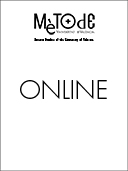¿Catástrofe, incertidumbre, oportunidad o riesgo? Puntos clave de la cobertura televisiva de los informes del IPCC en 2013/2014
DOI:
https://doi.org/10.7203/metode.6.4179Palabras clave:
cambio climático, cobertura mediática, informes del IPCC, Europa Resumen
Resumen
Este artículo examina la cobertura televisiva de los tres informes de 2013 y 2014 de los grupos de trabajo (WG) del IPCC en cinco países europeos: Alemania, Noruega, Polonia, España y Reino Unido. Se examinó la presencia, importancia y predominio de cuatro encuadres (catástrofe, incertidumbre, riesgo explícito y oportunidad) en cada uno de los telediarios analizados. El encuadre «catástrofe» fue el más fuerte de todos en las tres variables de medición. «Oportunidad» fue el segundo más presente, seguido por «incertidumbre». Aunque el IPCC enfatizó considerablemente el enfoque de la gestión del riesgo para enfrentarse al cambio climático en el anuncio del informe WG2, el encuadre «riesgo explícito» apenas estuvo presente. El Reino Unido destacó por incluir puntos de vista escépticos.
 Descargas
Descargas
 Citas
Citas
Adler, C. E., & Hadorn, G. H. (2014). The IPCC and treatment of uncertainties: topics and sources of dissensus. WIREs Climate Change, 5, 663–676. doi: 10.1002/wcc.297
Anderson, A. (2014). Media, environment and the network society. Houndmills: Palgrave Macmillan. Antilla, L. (2005). Climate of scepticism: US newspaper coverage of the science of climate change. Global Environmental Change, 15, 338–352. doi: 10.1016/j.gloenvcha.2005.08.003
Brossard, D., Shanahan J., & McComas, K. (2004). Are issue-cycles culturally constructed? A comparison of French and American coverage of global climate change. Mass Communication and Society, 7, 359–377. doi: 10.1207/s15327825mcs0703_6
Corbett, J., & Durfee, J. (2004). Testing public (un)certainty of science: Media representations of global warming. Science Communication, 26, 129–151. doi: 10.1177/1075547004270234
Cottle, S. (1993). Mediating the environment: Modalities of TV news. In A. Hansen (Ed.), The mass media and environmental issues. Leicester: Leicester University Press.
Dirikx, A., & Gelders, D. (2009). Global warming through the same lens: An explorative framing study in Dutch and French newspapers. In T. Boyce, & J. Lewis (Eds.). Climate change and the media. New York: Peter Lang.
Doulton, H., & Brown, K. (2009). Ten years to prevent catastrophe? Discourses of climate change and international development in the UK press. Global Environmental Change, 19, 191–202. doi: 10.1016/j.gloenvcha.2008.10.004
Doyle, A. (2013, September 18). Amid “uncertainty”, scientists blame mankind for global warming. Reuters.
Engels, A., Hüther, O., Schäfer, M., & Held, H. (2013). Public climate-change scepticism, energy preferences and political participation. Global Enviromental Change, 23(5), 1018–1027. doi: 10.1016/j.gloenvcha.2013.05.008
Entman, R. M. (1993). Framing: Toward clarification of a fractured paradigm. Journal of Communication, 43(4), 51–58. doi: 10.1111/j.1460-2466.1993.tb01304.x
IPCC. (2014). Intergovernmental panel on climate change: Fifth assessment report (AR5). Geneva: IPCC.
Kundzewicz, Z. W., & Matczak, P. (2012). Climate change regional review: Poland. WIREs Climate Change, 3: 297–311. doi: 10.1002/wcc.175
León, B., & Erviti, M. C. (2015). Science in pictures: Visual representation of climate change in Spain’s television news. Public Understanding of Science, 24(2), 183–199. doi: 10.1177/0963662513500196
Medienorge. (2014). Main news sources. Bergen: Medienorge. Retrieved from http://medienorge.uib.no/statistikk/aspekt/tilgang-og-bruk/374
Newman, N., & Levy, D. A. L. (2014). Reuters Institute digital news report 2014. Oxford: Reuters Institute for the Study of Journalism (RISJ).
Painter, J. (2011). Poles apart: The international reporting of climate scepticism. Oxford: Reuters Institute for the Study of Journalism (RISJ).
Painter, J. (2013). Climate change in the media: Reporting risk and uncertainty. Oxford: IB Tauris & RISJ.
Painter, J. (2014). Disaster averted? Television coverage of the 2013/14 IPCC’s climate change reports. Oxford: Reuters Institute for the Study of Journalism (RISJ).
Painter, J., & Ashe, T. (2012). Cross-national comparison of the presence of climate scepticism in the print media in six countries, 2007–2010. Environmental Research Letters, 7(4): 1–8. doi: 10.1088/1748-9326/7/4/044005
Schäfer, M., & Schlichting, I. (2014). Media representations of climate change: A meta-analysis of the research field. Environmental Communication, 8(2): 142–160. doi: 10.1080/17524032.2014.914050
Ward, R. E. T. (2014). In the public’s mind. Nature Climate Change, 4, 170. doi: 10.1038/nclimate2152
Zehr, S. (2000). Public representations of scientific uncertainty about global climate change. Public Understanding of Science, 9, 85–103. doi: 10.1088/0963-6625/9/2/301
Descargas
Publicado
Cómo citar
-
Resumen1606
-
PDF 375
Número
Sección
Licencia
![]()
Todos los documentos incluidos en OJS son de acceso libre y propiedad de sus autores.
Los autores que publican en esta revista están de acuerdo con los siguientes términos:
- Los autores conservan los derechos de autor y garantizan a Metode Science Studies Journal el derecho a la primera publicación del trabajo, licenciado bajo una licencia de Creative Commons Reconocimiento-NoComercial-SinObraDerivada 4.0 Internacional, que permite a otros compartir el trabajo con un reconocimiento de la autoría del trabajo y citando la publicación inicial en esta revista.
- Se permite y se anima a los autores a difundir sus trabajos electrónicamente a través de páginas personales e institucionales (repositorios institucionales, páginas web personales o perfiles a redes profesionales o académicas) una vez publicado el trabajo.





